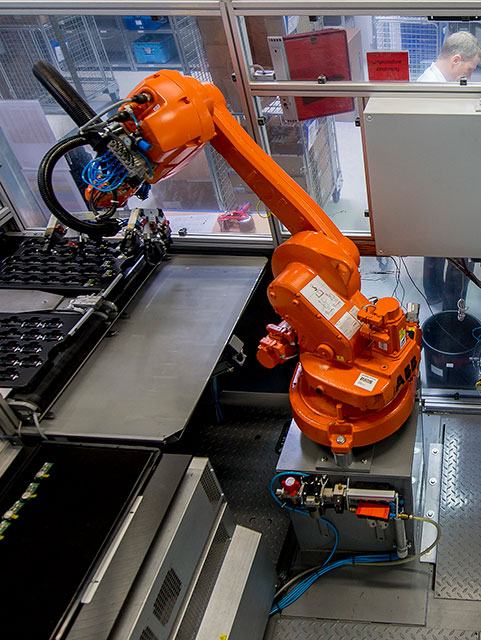
Angels GmbH
Das Unternehmen Angels ist ein führender Hersteller von Jeans und Damenhosen in Deutschland. Das Unternehmen legt besonderen Wert auf passgenaue Schnitte, nachhaltige Materialien und eine

A change in the shareholder structure often heralds a new era. However, such a change can also significantly weaken both a company’s ability to act and its financial strength. Both situations can be avoided by choosing the right financing solution.
Home | your targets | Changing the shareholder structure
To ensure that your company (and your investment) are not adversely affected by shareholder changes, we can offer you a variety of options depending on your needs: an equity interest, mezzanine financing or syndicated equity and debt.
We can help you and your company to navigate shareholder changes without a negative impact on day-to-day operations. We can give you access to our network of experienced executives and secure financial headroom for your company.
We can support your plans for growth both financially and strategically, drawing on the extensive experience gained from many years of partnering with growing businesses. Should you wish, our team of experienced professionals can also assist in operational matters.
The reasons why shareholders dispose of holdings are very varied:
A shareholder has reached a cut-off age stipulated in the articles of association; a shareholder wants to realize the value of their investment for financial reasons; the views of the shareholders with regards to strategic development are too divergent; not all shareholders are able to fund a financial injection that the company needs but dilution is not an option – and many more such reasons.
Matters become more complicated when the changes in ownership are the result of a conflict.
Changes to the shareholder structure can impact business operations. When active shareholders exit, this often creates a hole at management level. There is also a risk of losing valuable contacts, client relationships and informal expertise. If the shareholder changes are the result of conflict, this can paralyze the company for a long period. In a situation like this, it is even more important to seek professional support to mediate between the conflicting positions.
On the other hand, if a passive shareholder exits a company, the effect this has is largely dependent on who the successor is. Does the new shareholder hold similar views on dividends, investments and further capital injections? This will play a role in whether the new shareholder structure improves or strains liquidity or the company’s overall financial stability.
First off, the exiting shareholder needs to find a successor – and buyer – for their holding. This could be the company per se – in that it pays out the shareholder and cancels the shares. This has the benefit that the remaining shareholders increase their holdings with corresponding higher shares in the profit and equity value. That said, the buyout of a shareholder using company funds can impact the company’s financial position. For this reason, this option should only be considered by companies that are well funded and have no plans for major investments.
A similar option would be to distribute the shares – either in equal parts or proportionally based on their existing holdings. In this case, the shareholders and not the company would finance the purchase. Should a shareholder – be it for financial or other reasons – not acquire their alloted share, this is then shared out among the remaining shareholders.
Both of the above options have the benefit of protecting the company from the “unknown quantity” of a new shareholder – and all that this entails in terms of strategic uncertainty. On the other hand, it also means that no fresh ideas or new momentum are brought in. And that financial resources are more limited than before.

In many instances, a new shareholder follows – either a private investor, an operating company or a financial investor. With any change in the shareholder structure, the existing shareholders should always try to base their choice on factors that reflect the company’s best interests.
With this in mind, the following four aspects should be considered,
among other things:
The last aspect, in particular, causes some shareholders to shrink back from considering an operating business (irrespective of antitrust issues).
There are usually grave concerns that important know-how will be transferred away or that the company will be swallowed up.
Private investors, on the other hand, are more likely
to be an option for smaller businesses or minority holdings, given their limited financial resources – for the most part, at least.
Are increasingly seen as an attractive option when companies are faced with changes to the shareholder base (see text Company Succession). However, it is important to find the right partner (see text Equity Investors: the selection criteria) – VR Equitypartner is one of the few investors that also considers minority shareholdings.
A change in ownership offers a company the opportunity to reposition itself for growth and stability in the future. A minority shareholding held by VR Equitypartner can give your company the right performance-oriented support.

Das Unternehmen Angels ist ein führender Hersteller von Jeans und Damenhosen in Deutschland. Das Unternehmen legt besonderen Wert auf passgenaue Schnitte, nachhaltige Materialien und eine

Das Unternehmen Die Hero Textil AG, ein anerkannter Nischenplayer für funktionale Textilbestandteile mit Sitz in Crailsheim, entwickelt und produziert elastische Textil-Einsätze mit großem Fertigungs- und
Managing Director
Managing Director
+49 69 710 476 – 115
Managing Director
Managing Director
+49 69 710 476 – 113
Vom Hauptbahnhof Münster/mit öffentlichen Verkehrsmitteln:
Mit dem Taxi benötigen Sie etwa 10 Minuten.
Mit öffentlichen Verkehrsmitteln gibt es vom Hauptbahnhof mehrere Buslinien. Sie nehmen entweder die Buslinie 7 Richtung Kriegerweg, die Linie 15 Richtung Albachten oder die Linie 16 Richtung Mecklenbeck. Die Ziel-Bushaltestelle heißt in jedem Fall “DZ HYP/IHK”. Von hier überqueren Sie die Weseler Straße und finden schräg gegenüber den Sentmaringer Weg. Gleich im zweiten Haus auf der linken Seite (Hausnummer 21) finden Sie die VR Equitypartner GmbH.
Mit dem Auto:
Von der A1 und A43 kommend, fahren Sie am Autobahnkreuz Münster-Süd auf der B51 und später auf der B219 (Weseler Straße) Richtung Münster-Innenstadt. Nach der zweiten großen Kreuzung biegen Sie nach knapp 400 m rechts in den Sentmaringer Weg. Die VR Equitypartner GmbH finden Sie auf der linken Seite.
Frankfurt
VR Equitypartner GmbH
Platz der Republik
60265 Frankfurt am Main
Entrance:
Cityhaus I
Platz der Republik 6
Entrance via Friedrich-Ebert-Anlage
From Frankfurt Airport:
Take the A5 towards Frankfurt to Westkreuz Frankfurt. Follow signs towards Frankfurter Westkreuz and Messe. From there, drive into Friedrich-Ebert-Anlage and follow the arrows on the map.
Parking is available in the public car park “Westend” in Savignystraße.
On request, we are happy to reserve one of our visitor parking spaces in Cityhaus I for you.
The entrance is in Erlenstraße.
With public transport:
Take S-Bahn line S8 or S9 (towards Frankfurt Hbf., Offenbach or Hanau) and you will arrive directly at the main station (Hauptbahnhof).
U-Bahn line U4 or U5 – Station Frankfurt(Main) Hbf.
It then takes around 5 minutes on foot from the station to VR Equitypartner.
Tram lines 11, 16, 17, 21 – Platz der Republik stop.

Mit dem Laden des Videos akzeptieren Sie die Datenschutzerklärung von YouTube.
Mehr erfahren